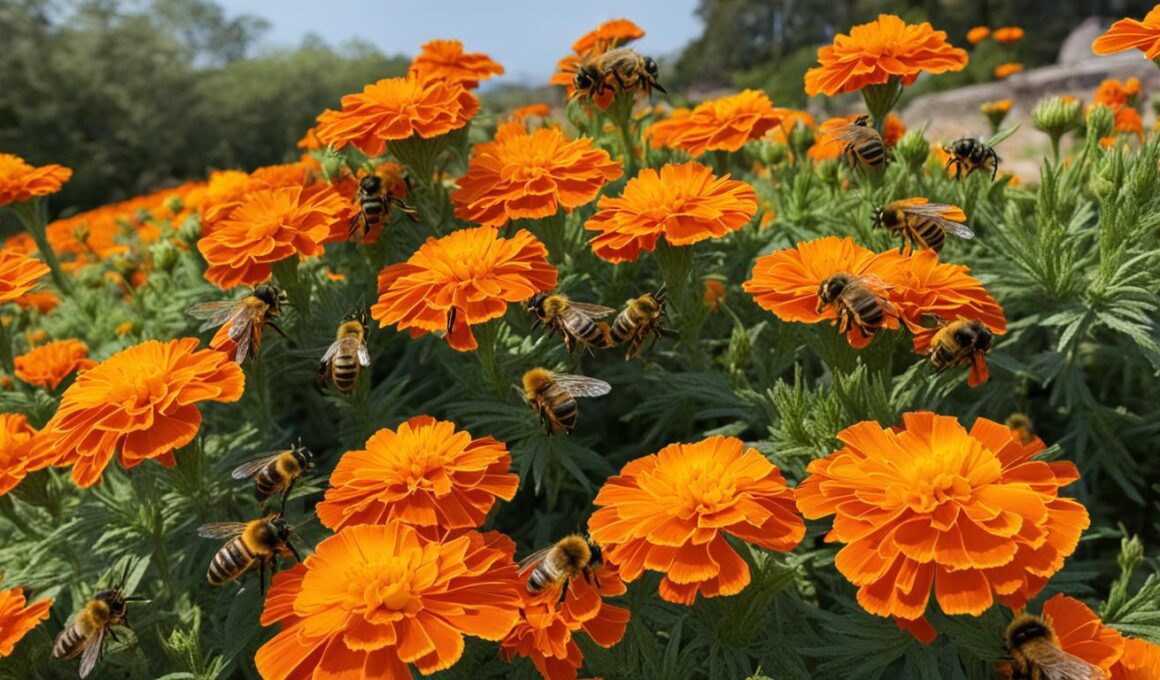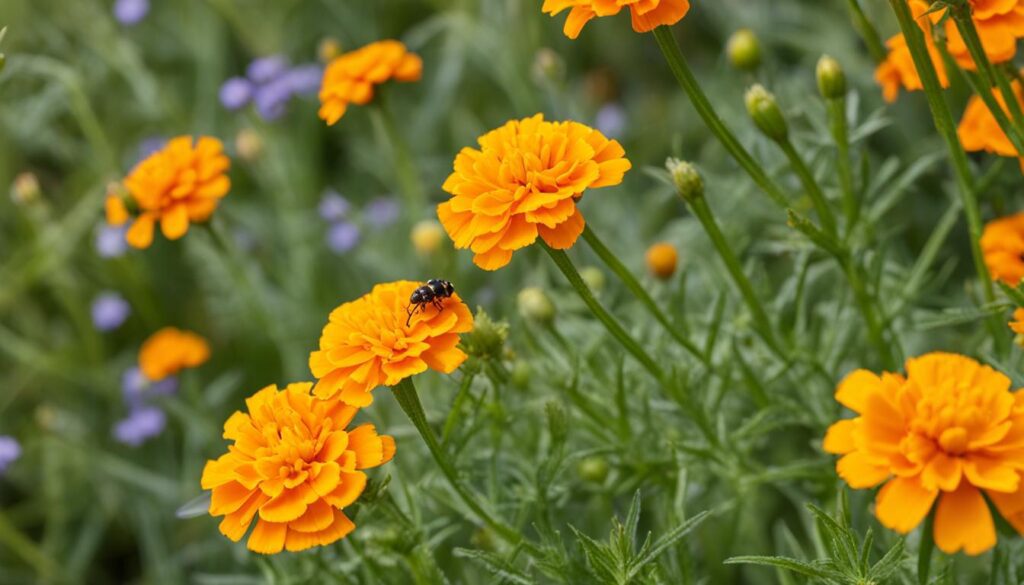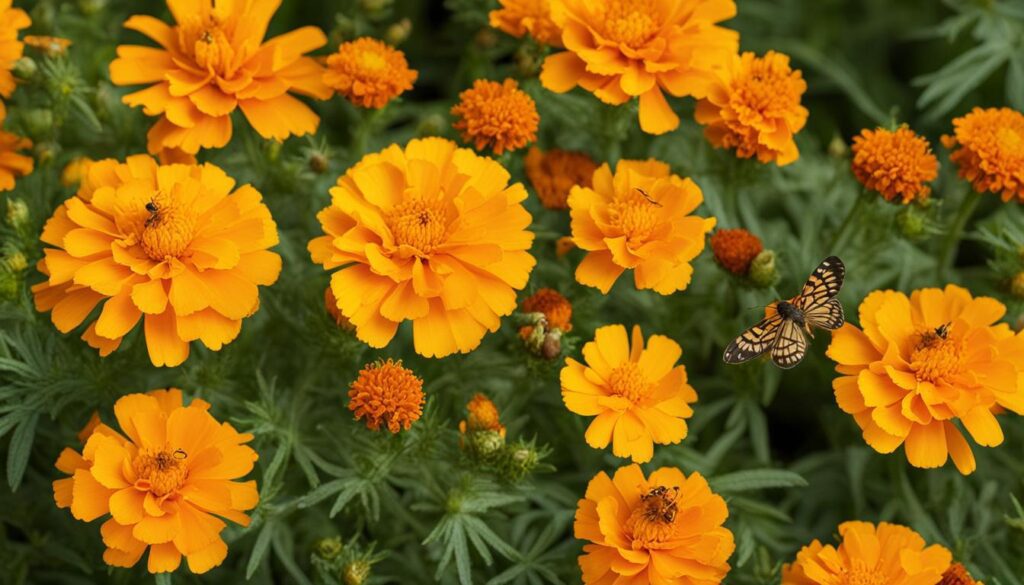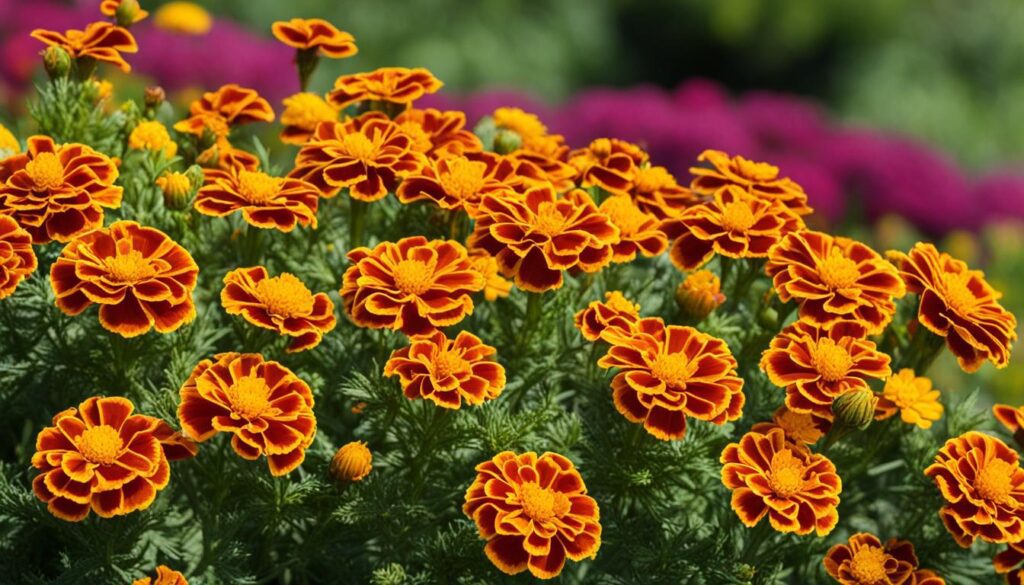Marigolds are known to attract a variety of beneficial insects in the garden, including hover flies, ladybugs, and parasitic wasps. While there is little scientific evidence to support the claim that marigolds repel pests, they have been found to be effective in controlling nematodes. Marigolds release a toxic chemical from their roots that inhibits the hatching of nematode eggs, making them a valuable tool in nematode control. Additionally, marigolds can attract certain pests away from other plants, providing some level of pest management. Despite the lack of conclusive evidence, many gardeners swear by the use of marigolds for pest control in their gardens.
Key Takeaways:
- Marigolds attract beneficial insects like hover flies, ladybugs, and parasitic wasps.
- They have been found to be effective in controlling nematodes.
- Marigolds can attract certain pests away from other plants.
- Their use for pest control is widely practiced despite limited scientific evidence.
- By planting marigolds, you can enhance the biodiversity of your garden and promote a more balanced ecosystem.
The Plant Profile of Marigolds
Marigolds, classified under the genus Tagetes, are beautiful flowering plants belonging to the aster family. They are native to subtropical America and have been cultivated for thousands of years. There are three main species of marigolds: African marigolds (T. erecta), French marigolds (T. patula), and Signet marigolds (T. tenuifolia).
African marigolds are known for their large flowerheads, making them a popular choice in gardens for their vibrant colors. French marigolds come in various colors and sizes, offering a wide range of options for gardeners. Signet marigolds are smaller in size, with delicate flowers and foliage, making them a charming addition to any garden.
Marigolds are versatile plants that can thrive in various soil types and conditions. They are often used as border plants, adding a splash of color and attracting beneficial insects to the garden. With their rich history and diverse characteristics, marigolds are a delightful choice for both experienced and novice gardeners.
Fact or Fiction: Do Marigolds Repel Pests?
Marigolds have long been hailed as a natural pest repellent in gardens. However, when it comes to scientific evidence, the verdict is still out. While many gardeners swear by the pest-repelling properties of marigolds, limited research has been conducted to support these claims. In fact, studies conducted at Rutgers University have found that marigolds do not repel pests such as cabbage, carrot, and onion pests.
According to the USDA, marigolds themselves can be targeted by a range of pests, including aphids, Japanese beetles, snails, and spider mites. This suggests that marigolds may not possess the inherent ability to repel pests in the same way as some other plants. However, it is worth noting that researchers at the University of Vermont have discovered that marigolds can attract pests away from other ornamental plants, potentially providing a form of indirect pest management.
While the lack of scientific evidence may cast doubt on the pest-repelling claims, marigolds still have their place in the garden. They are known to be effective in controlling nematodes, which are microscopic worms that can damage plant roots. The roots of marigold plants release a toxic chemical called alpha-terthienyl, which inhibits the hatching of nematode eggs. This can disrupt their life cycle and help reduce their population. So, while marigolds may not repel pests in the traditional sense, they still offer some level of pest management and can contribute to a healthier garden ecosystem.
Expert Tip:
“While marigolds may not repel pests as some believe, planting them in your garden can still be beneficial. They attract beneficial insects such as hover flies and ladybugs, which prey on pests and act as natural pest control. Plus, the vibrant colors of marigold flowers can brighten up any garden space!”
So, while marigolds may not be the ultimate solution for pest control, they can still play a valuable role in your garden. Whether it’s attracting beneficial insects or controlling nematodes, marigolds offer a natural and ecologically sound approach to managing pests. So, go ahead and plant these beautiful flowers in your garden, and enjoy the added benefits they bring!
Marigolds and Nematode Control
Marigolds have been found to be effective in controlling certain nematodes, which are tiny worms that feed on plant roots. The roots of marigolds release a toxic chemical called alpha-terthienyl, which inhibits the hatching of nematode eggs. This disrupts the nematode life cycle and helps to reduce their population.
However, it should be noted that the beneficial effects of marigolds in nematode control are only realized when they are planted at least 2 months before the vegetable crop and in the same location. Certain varieties of marigolds have been found to be more effective at controlling nematodes, and soil testing can help determine the suitable variety for a specific nematode problem.
By incorporating marigolds into your garden, you can naturally suppress nematode populations and protect the roots of your plants. This can lead to healthier, more productive crops without the need for synthetic chemical treatments. Plus, marigolds add vibrant color and visual interest to your garden, making them a great addition to any landscaping design.
Choosing the Right Marigold Variety
- African Marigolds (T. erecta): These marigolds have large, showy flowerheads and are known to be highly effective in nematode control.
- French Marigolds (T. patula): French marigolds come in a variety of colors and sizes and have moderate nematode control capabilities.
- Signet Marigolds (T. tenuifolia): Signet marigolds are compact plants with smaller flowers and leaves. While they may not be as effective in nematode control as African marigolds, they still offer some level of protection.
“Marigolds release a toxic chemical from their roots that inhibits the hatching of nematode eggs, making them a valuable tool in nematode control.”
So, if you’re looking for a natural and eco-friendly way to control nematodes in your garden, consider planting marigolds. These beautiful flowers not only add aesthetic value to your garden but also provide an effective defense against nematode damage.
Marigolds and Beneficial Insects
Marigolds not only add a pop of color to your garden, but they also attract a variety of beneficial insects that can help keep pests at bay. These insects play a crucial role in maintaining a balanced ecosystem and promoting a healthy garden. By planting marigolds, you can create an environment that supports the presence of these helpful bugs.
One of the beneficial insects commonly attracted to marigolds is the hover fly. Hover flies are excellent pollinators and their larvae feed on aphids, thrips, and other garden pests. By luring hover flies to your garden with marigolds, you encourage their population to thrive and help control harmful insect populations. Additionally, ladybugs are also known to be attracted to marigolds. These colorful beetles are voracious predators, feeding on aphids, mealybugs, and other soft-bodied pests that can damage your plants. Marigolds serve as a natural magnet for ladybugs, ensuring that your garden has a steady supply of these helpful insects.
Another beneficial insect that marigolds can attract is the parasitic wasp. These tiny wasps lay their eggs in the bodies of pests such as caterpillars and aphids, effectively parasitizing and eventually killing them. By planting marigolds, you provide a habitat and food source for these wasps, encouraging them to set up residence in your garden and provide natural pest control.
Conclusion
In conclusion, while scientific evidence may be limited, marigolds have proven to be valuable in pest control, specifically in nematode control and attracting beneficial insects. Although marigolds may not repel pests entirely, their pungent scent is believed to have some level of repellent effect. By planting marigolds in your garden, you can potentially reduce nematode populations and attract beneficial insects that aid in natural pest management.
Marigolds offer a natural and ecologically sound approach to pest control, contributing to the overall biodiversity of your garden. Not only do they add vibrant colors and beauty to your outdoor space, but they also promote a balanced ecosystem by attracting a variety of beneficial insects, such as hover flies, ladybugs, and parasitic wasps. These insects not only help pollinate plants but also prey on harmful bugs, acting as natural pest control agents.
So, if you’re looking for a holistic approach to pest management that also enhances the biodiversity of your garden, consider planting marigolds. Their ability to control nematodes and attract beneficial insects makes them a valuable addition to any garden, providing an eco-friendly alternative to chemical pesticides.
Are Marigolds Effective in Attracting Pollinators to Your Garden?
Marigolds as pollinators secret unlock lies in their vibrant colors and strong scent, which attract bees, butterflies, and other beneficial insects. Planting marigolds in your garden can help increase the number of pollinators, leading to healthier and more abundant blooms for your other plants.
FAQ
Do marigolds attract beneficial insects?
Yes, marigolds are known to attract a variety of beneficial insects in the garden, including hover flies, ladybugs, and parasitic wasps. These insects not only pollinate plants but also prey on bad bugs, acting as natural pest control agents.
Can marigolds repel pests?
While there is little scientific evidence to support the claim that marigolds repel pests, they have been found to be effective in controlling nematodes. Marigolds release a toxic chemical from their roots that inhibits the hatching of nematode eggs, making them a valuable tool in nematode control. However, marigolds may attract certain pests away from other plants, providing some level of pest management.
What pests do marigolds attract?
Marigolds can attract a variety of pests, including aphids, Japanese beetles, snails, and spider mites. However, researchers have found that marigolds can also attract these pests away from other ornamental plants, offering some level of pest management.
How do marigolds help with nematode control?
The roots of marigolds release a toxic chemical called alpha-terthienyl, which inhibits the hatching of nematode eggs. This disrupts the nematode life cycle and helps to reduce their population. It’s important to plant marigolds at least 2 months before the vegetable crop and in the same location for the beneficial effects in nematode control to be realized.
What types of marigolds are there?
Marigolds belong to the aster family and are classified under the genus Tagetes. The three most common species of marigolds are African marigolds (T. erecta), French marigolds (T. patula), and Signet marigolds (T. tenuifolia). African marigolds are known for their large flowerheads, while French marigolds come in various colors and sizes. Signet marigolds are compact plants with smaller flowers and leaves.












